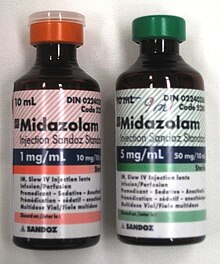Midazolam
Midazolam is a drug. It is used as a sedative, it calms people down. It is also used as an anesthetic. It will make people sleepy. It also causes anterograde amnesia[1] In some parts of the world it is known as Versed.

Midazolam is a benzodiazepine. This means that people will get addicted to it, if they take it for a longer period of time.
The drug does not make people to become unconscious, it only sedates them.[1] Midazolam is also used to treat long-lasting seizures.[2] Most often, a seizure is short. Midazolam is available in different forms; there are tablets to be taken by mouth, there is a solution that can be injected, and there are ways to allow to give it anally. There's also a spray. When it is injected, it usually starts working within as little as five minutes. Effects last between one and six hours.
Side effects include a decrease in efforts to breathe, low blood pressure, and sleepiness.[1] Tolerance to its effects and withdrawal syndrome may occur after long-term use.[3] Paradoxical effects, such as increased activity, can occur especially in children and older people.[3] There is evidence of risk when used during pregnancy but no evidence of harm with a single dose during breastfeeding.[4][5] Like other benzodiazepines, it works by increasing the activity of the GABA neurotransmitter in the brain.
Midazolam was patented in 1974 and came into medical use in 1982.[6] It is on the World Health Organization's List of Essential Medicines.[7] Midazolam is available as a generic medication.[4]In many countries, it is a controlled substance.[1] This means that a medical prescription is required to get it.
In the past, midazolam has been used for the following:
- Acute management of longer epileptic seizures, including status epilepticus.
- As a sedative for someone before a medical intervewntion (usually combined with an opioid such as fentanyl)
- To manage agitation in diseases such as Schizophrenia, usually combined with an antipsychotic.
- End-of-life care